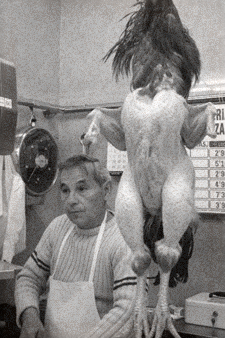|

Nate's Fish and Poultry Shop
By G. David Schwartz
I do not particularly like eating chicken. This is a curious position
for a Jewish person to be in. Chicken is virtually the staple of Shabbat
dinners on Friday evenings. Chicken is the fundamental Jewish response
to illness. But I do not enjoy eating chicken.
Maybe my life would have been entirely different if the man I most
respected in life had not owned a chicken store. My grandfather, Nathan
Oscherwitz, was the son of a dairy farmer and milk deliverer. His father
was struck in the head with a pistol during a robbery attempt and died
some days later. My grandfather subsequently found himself investing
everything he had into a haberdashery. In later years, he liked to say
of this experience, "I lost the shirt off my back."
When I was born, my grandfather owned the poultry shop. My earliest
memories find me in that most unsanitary place, where live chickens
were butchered according to the specification of customers. I can see
images of my young self sticking my fingers into wire cages that held
between ten and thirty squawking chickens. I can hear my grandfather's
hurried warning not to stick my fingers in the cages as he turned from
one customer to another. "Okay, what do you want?" he would
inquire with a businesslike impatience.
I remember naming chickens, although I cannot recall any of the names
I gave the domestic fowl. Unbeknownst to me at the time, each of the
fowl was dead within hours or days at most. Nor did the twinkling look
of bemusement ever leave my grandfather's eyes as his gaze darted impatiently
from customers to tenderly observe me.
Spoiled, I was. I had the run of the store. I was in charge of naming
chickens and sticking my fingers into cages where, yes, they were pecked.
But in retrospect, it is not clear who ran the store.
Clearly, my grandfather was the owner. But when I reach into that bemused
perspective that my grandfather willed to me even while he was alive,
it is apparent that the chickens ran the shop. They cackled when anyone
approached, and everyone present knew that the cackling was a demand
to be left alone, or taken. Once in awhile one of the men would reach
for a chicken and, in response to the cackling which was delivered,
either leave that particular chicken alone, or speak with it as it was
taken behind the counter, behind the great wall, to be slaughtered.
My grandfather, the men who worked with him, myself, and the customers:
we were all at the bidding of the chickens. And I suspect that my grandfather
and the men he worked with knew it.
There was a symbiosis between myself and the chickens, between the chickens
and the shop, and between the men who worked with my grandfather and
the job which had to be done. They were great black men, as any man
is great to a child who stood only four foot tall. They had great, guttural
laughter and I, the prince of chicken naming, was also the crown prince
of generating laughter.
The issue can be raised: were these men genuinely happy? Was it just
my impression or were they engaging in a denial of their true feelings,
a show which would have been their perceived qualifications for keeping
their job? It is a matter of honoring my grandfather to at least think
that I experienced his intimacy with these men, their freedom to be
genuinely at ease in the shop. But does remembering in this manner simply
mask the truth?
My grandfather would have restrained no one. The proof? Smiling black
men — Jake, Bert, Mo — would take time from their activities
to stand next to me, put massive arms around my shoulders, and ask in
a teasingly astute manner: "How do you know that one's name is
Henry?"
I was never "Dave." I was always "Nate's grandson."
For someone who had always been told "David! Get away from there!"
or "Don't do that, David!" the change was refreshing.
Later, a friend from South Carolina would tell me that at the very same
time in her life, black men would not dare address a white person by
their first name.
What a rush! In the world controlled and directed by the life, naming,
and death of chickens, my grandfather was "Nate," and I was
"Nate's grandson."
How different are our experiences.

|
